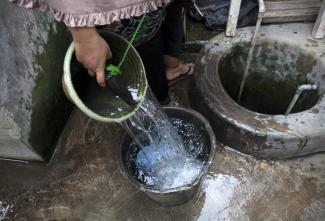
Do the preparation task first. Then read the article and do the exercises.
Preparation
Water is vital. Between 55 and 60 per cent of the adult body is made of it and every living cell needs it to keep functioning. In normal conditions, the human body can only survive three or four days without water. We need water to stay alive, yet there are billions of people all over the world who do not have access to safe drinking water.
World Water Day
The first World Water Day was celebrated in 1993. It was first proposed at the United Nations (UN) conference on environment and development in Rio de Janeiro in 1992 and has been celebrated annually on 22 March since then. Every year the UN releases its World Water Development Report on or around this date. Each year has a different theme, looking at things like the role of clean water in the world of work, ways to stop wasting water, finding ways to supply water to underprivileged groups and so on.
Safe water is a human right
Clean drinking water is fundamental. But it is also vital for sanitation and hygiene. It is estimated that more than 700 children under the age of seven die every day from illnesses linked to unsafe water and poor sanitation. The right to water and sanitation was recognised as a human right by the UN General Assembly in 2010. However, there are still at least 2.1 billion people around the world who live without safe water in their homes. These include rural communities, people who have been displaced due to war and local conflicts and areas where climate change is making water more and more scarce.
The problems facing communities without water
Apart from the obvious health issues, a lack of accessible clean water means that people – often women and children – spend hours every day walking to and from distant water supplies. This means they don't have time to dedicate to work, studies and other domestic duties. The search for water becomes their main occupation. And people who are not able to walk to get their own water are particularly vulnerable.
For many people, access to water has become increasingly difficult due to increased demand for a finite resource. According to figures released by the UN, around 4 billion people – nearly two-thirds of the world's population – experience severe water scarcity during at least one month of the year. It is believed that by 2030 as many as 700 million people worldwide could be displaced by intense water scarcity.
What are the solutions?
There are many charities working on creating sustainable supplies of clean water at a grass-roots level for different communities around the world, and this important work needs to continue and to expand. But the fundamental problem of increasing demand for a limited resource can only be addressed by more efficient use of water, especially in industry and agriculture. Waste-water recycling, capturing rainwater, more efficient irrigation techniques and reforestation are all examples of how water can be used more efficiently.
What we can do to help
As individuals, what we can do to help is support charities, raise awareness, take part in the World Water Day events that are happening all around the world and, of course, be careful with how we use water in our own lives. Visit the UN World Water Day website to find out about an event near you. Follow #worldwaterday on social media and help spread the word about this incredibly important issue.
Sources
Discussion
Language level
- Log in or register to post comments
- Log in or register to post comments
- Log in or register to post comments



